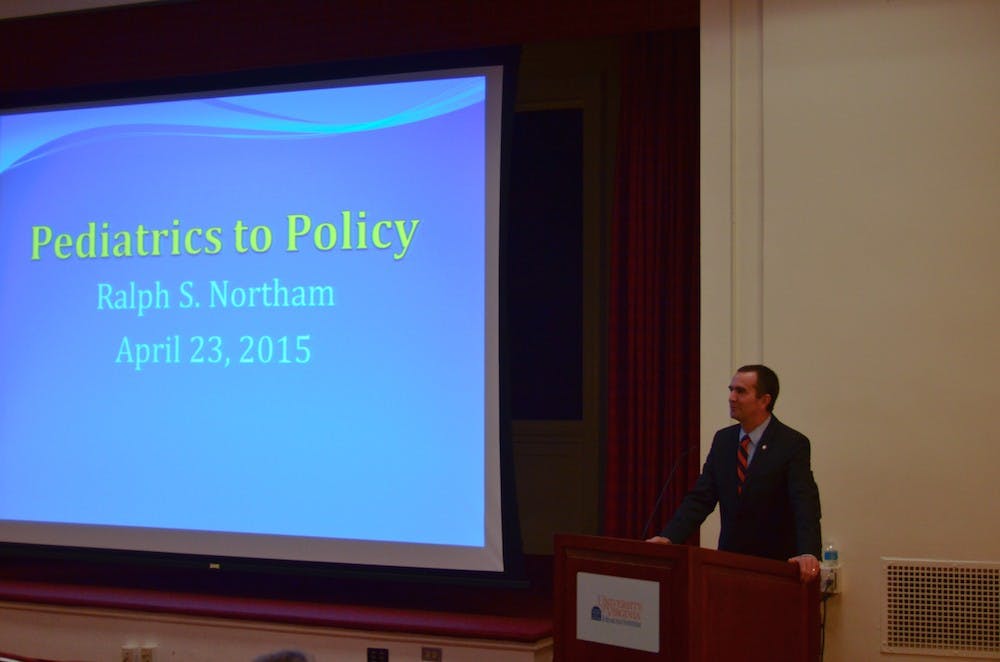Commonwealth Lt. Gov. Ralph Northam (D) addressed the University Medical School’s pediatric department last Thursday morning on a range of topics including how a bill becomes a law, the dangers of smoking and how to best evaluate concussed high-school athletes.
Northam is a pediatric neurologist at Children’s Hospital of the King’s Daughters and an assistant professor of neurology at Eastern Virginia Medical School (EVMS). He is also the long-time volunteer director of Edmarc Hospice for Children.
“The first question which people ask me, which I think is a valid question, is ‘Why would a pediatric neurologist who has a family and has a good practice, a busy practice, want to get into politics?’” Northam said.
Northam said that while practicing medicine in the early 2000s, he grew increasingly frustrated with the way doctors had to interact with insurance companies. Despite having no prior political experience, Northam decided to run for the Virginia state senate and was elected to represent the sixth district in 2007, and again in 2011.
“Almost immediately after I was sworn in, I had a knock on the door,” Northam said, “It was Governor Kaine. And he said ‘Ralph, you know, Virginia would be a much healthier commonwealth if we didn’t have to be exposed to secondhand smoke when we went into restaurants.’ He said ‘As a pediatrician, I think you’d be a good person to patron that legislation.’”
The ban on smoking in restaurants took effect on Dec. 1, 2009. Northam then patroned a bill that would outlaw smoking in a car with a minor present, which passed the Senate, but not the House.
After addressing his political career, Northam then began a more medically-focused presentation that discussed some misunderstandings about concussions.
“Despite better equipment [and] better helmets… it’s just all a matter of physics and just the acceleration-deceleration,” Northam said. “When the brain just suddenly stops, it’s just not what it was designed to do.”
There are two main processes that make a concussion, he said. The first is called axonal-shearing, in which the movement of the brain during an impact stretches axons and strips them of their myelin — a protective layers around axons — causing information to be transmitted more slowly.
The second is a cascade of signal chemicals, called neurotransmitters. The unusual amounts of chemical signals being sent causes the brain to function improperly for a period of time.
Northam said that contrary to common perception, only about 10 percent of the 3.8 million concussions that occur yearly involve a loss of consciousness.
““It doesn’t necessarily have to be someone who’s unconscious,” Northam said. “It can be just what we call a ‘bell-rung’ or just a ‘ding’ to the head that causes the concussion.”
Northam also clarified misinformation about the Affordable Care Act.
He called attention to the part of the law that prohibited companies from “cherry-picking healthy people” and denying coverage to those with pre-existing conditions, saying the ACA would prevent people from having to fear losing coverage if they changed jobs.
Northam’s final point focused on medicaid expansion. He said that it made sense from a business perspective, because taxpayers have already paid for it. He claimed that by not accepting medicaid expansion, Virginia could lose around $5 million a day, much of which would then go to surrounding states.
“Medicaid expansion is designed to provide coverage for up to 400,000 working Virginians,” Northam said. “And I would underline the word working. These are individuals who have one, two or three jobs, but they can’t afford coverage.”
The point that he thought students should be most worried about, though, was the ACA provision that allows people to stay on their parent’s health insurance until they’re 26.
“What a great way to help them get started, by keeping them on your policy,” Northam said. “That way they can focus on getting a quality education.”







